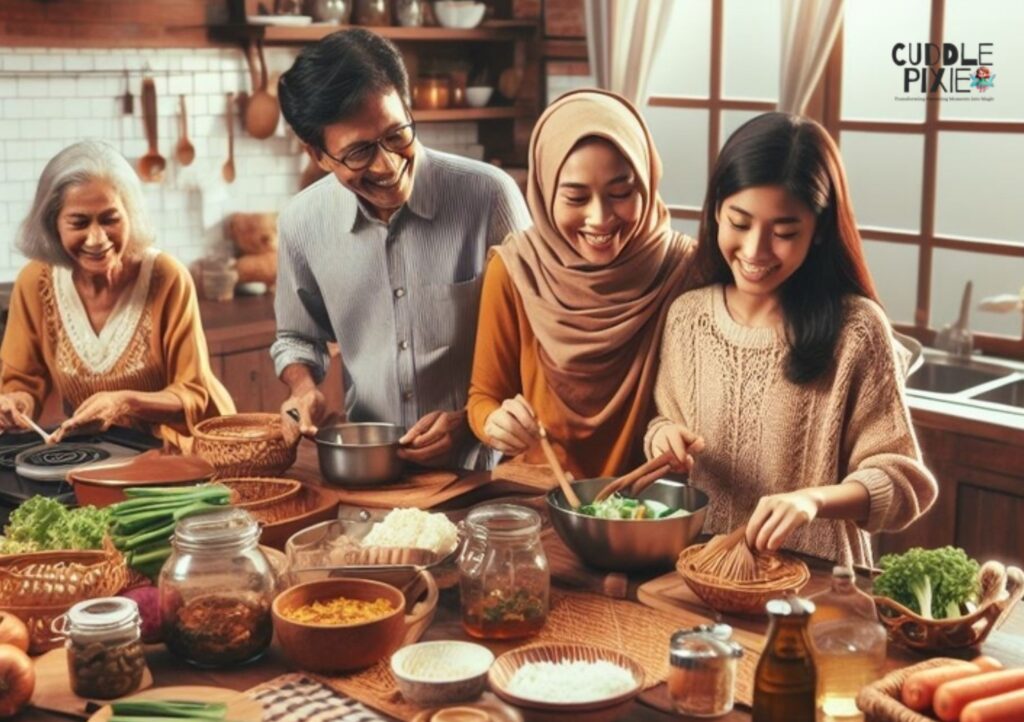Family traditions are activities or ceremonies that parents and their children usually engage in periodically. Such traditions can be, for instance, a holiday that is critical to the family or even a small ritual like reading a story before going to bed. Regardless of their size, traditions are crucial in helping the members of a family feel closer to each other and have some good memories to treasure. In this article, we will look at the pleasure of family rituals and how a good ritual makes people’s lives happier.
In This Article
What Are Family Traditions?
Traditions are activities that are repeated over some time and are usually performed repetitively by family members. They may vary from family to family and are likely to represent the family’s culture, religion, or ethnic background. Traditions can range from having Sunday lunch at home to having the whole family gather together once a year. Some common examples include:

- Holiday Celebrations: Decorating a tree, lighting the candles, preparing for Diwali and other special events, or having particular customs and actions.
- Birthdays: Some unique ways that families can observe and celebrate each member’s birthday.
- Seasonal Activities: A lot of people like to go apple picking in the autumn or go to the beach in the summer.
- Daily Routines: Stroll at night, at mealtime with the family, or even read to the children before they go to bed.
These traditions are not just about the activities themselves and the rituals that are followed but the significance of the activity and the bond it forms.
Why Is It Vital to Keep Family Traditions?
That is why family traditions are important for several reasons: It is a way of ensuring togetherness, a source of identity, and a way of recording events in the lives of family members that can be looked at and appreciated in the future.
-
Strengthening Family Bonds:
Family traditions involving spending time together are important since it is a great way through which the members of the family get to know one another better. Families also have moments when they make an effort to do activities together and this makes them bond. For instance, preparing food for the family or preparing a house for a certain occasion can be fulfilling and enjoyable because, during the process, members of the family can unite to accomplish a common goal. -
Providing a Sense of Belonging:
Culture offers family members an identification, which enables them to relate well. This awareness leaves family members feeling privileged and close because they know that the practices that they are implementing are exclusively practiced within their family. This is particularly crucial concerning individuals of a young age, as it assists in shaping the identity of a particular individual. For instance, a child who takes part in celebrating the holiday of a particular family will be more prideful and affiliated with that family. -
Creating Lasting Memories:
Family traditions are meant to be cherished for a lifetime since they give the family a chance to have fun with each other. Such memories are essentially transformed into stories that are repeated and shared within the family framework, which enhances the bonds of togetherness. Traditionally, people look back to these moments with deep sentiments of nostalgia and pass the traditions to their own families.

Examples of Family Traditions
Families are unique in having various traditions and, therefore, unique in their way. Here are some examples of family traditions that can create meaningful memories:
Holiday Celebrations
- Christmas: Putting up a Christmas tree, cookie baking session, and gift swapping.
- Easter: Some of the activities that children can engage in during Easter include the hunt for Easter eggs, Easter egg decorating, and partaking of a special Easter meal.
- Diwali: Diwali is again associated with lighting diyas (lamps), preparing sweets, and bursting firecrackers.
Seasonal Activities
- Fall: Pumpkin picking at the pumpkin patch, carving pumpkin, drinking hot cider.
- Winter: Making snowmen, ice-skating, and having hot Chocolate night.
- Spring: Tending for plants, holding a barbecue, and enjoying a nature trail.
- Summer: Swimming, sunbathing, picnicking, and fishing are some of the activities that people engage in within the coastal region.
Family Milestones
- Birthdays: Having a party, serving breakfast, or making a scrapbook with pictures and words for the birthday.
- Anniversaries: Gathering for a meal, watching a slideshow, and reminiscing.
Daily and Weekly Traditions
- Family Dinner: Eating meals together, having an opportunity to discuss what happened throughout the day, and spending time with one another.
- Movie Night: Friday movie night where they sit together and watch a movie with popcorn and other snacks.
- Game Night: Spend time visiting friends or families telling stories, making jokes, and playing board games or card games over the weekend.

How to Start New Family Traditions
It is especially important to make an effort to develop new traditions for your family since this will help to bond as well as enjoy time together. Here are some tips on how to start new traditions:
-
Involve Everyone:
In planning and decision-making concerning family activities, all the members of the family must be involved. This way, everyone feels that they are contributing to it and no one is left behind on starting the new tradition. -
Start Small:
The top doesn’t have to be huge and very complicated no matter how ambitious your project is. Fulfilling life does not necessarily mean it is intense and filled with events; simple actions can also be as valuable. For instance, one could begin with a weekly family strolling or a once-a-month movie night. -
Be Consistent:
Since traditions imply the continuous repetition of certain practices or activities, consistency is crucial to creating one. Be consistent and maintain with it. In the long run, it will become part of the family’s daily practices that one will not be able to imagine living without it. -
Be Flexible:
On one hand, it is crucial to be consistent in some ways, but on the other hand, it is also permitted to be diverse. It is always important to remember that life is full of surprises and thus at more than one time we might have to change our plans. What can be more important than time spent on end and the moments shared? -
Make It Fun:
Just make sure that the tradition you set for yourself and the people you care about is fun for all. If it doesn’t bring joy or enjoyment, it will not likely turn into a tradition that is followed year after year. Ensure everyone in the family anticipates the occasion by considering what everyone wants for the barbecue.

Passing Down Family Traditions
As time passes, families need to teach the new generations about the culture that the families hold. Here are some ways to ensure that traditions are carried forward:
-
Teach and Explain:
It would also be pertinent to share more about the significance and origin of each tradition to the younger generation. This assists them to catch up with tradition and even embrace it. -
Get the Kids Involved:
The activities should be carried out with children from a tender age so that they can participate actively. The more they participate, the more they will grow up valuing and sustaining the traditions than if they are left out. -
Adapt and Evolve:
These traditions do not necessarily have to stay the same year after year; they just need to be preserved. It can be versatile to change to a specific period or suit the modern generations’ preferences. Allow the junior members of the family to bring their creativity into how these traditions will be observed. -
Celebrate the Old and New:
Yes, the tradition is good to follow; however, it is always fun to set new trends. Teach those young people to begin new fashions and trends but at the same time respect the previous ones.
The Lasting Impact of Traditions
Traditions of a family are not just the activities that are done over and over; they are the rhythm of the family’s life, the primary interactions that are filled with love and continuity. Most of these traditions may be as elaborate as the large holiday celebrations or as mundane as the morning routines, but they form a rich fabric of beloved memories that foster togetherness and guarantee personal and family unity and purpose.
By engaging in family traditions on a routine basis, people are given ways to spend time together with their families and get to know them better, which contributes to the development of trust and affection. These are the narratives that families establish, and these narratives are the basis upon which families build their histories that are enhancing to each member’s identity. To the children, particularly, these traditions provide a model framework in which children can grow, be educated, and feel wanted as part of society.
It is always fun to introduce new customs into a household, as it is exciting and can give a focus to a lot of families. Regardless of whether it is a weekly game night, an annual holiday party, or every night before bedtime, these do not have to be complicated or expensive to have meaning. The main things in this regard are regularity, active engagement, and fun. By inviting everyone into the process and being willing to change traditions to maintain their relevance for the family, it is possible to continue to value the traditions without leaving anyone feeling excluded or left behind.
However, traditions should be passed on to the generations to come as well. Thus, it should be noted that, by explaining to children the importance and the fun of performing these rituals, and by involving them in this process, families can guarantee that their family traditions will remain preserved. This transfer of the family traditions also serves to remind a subsequent generation to accept the legacy that has been passed down to him or her, and that they too can make their contributions, thus enriching the family practices with new significances and pleasures.
Therefore, one must appreciate family traditions as precious assets that bring joy and meaning to family relations, help to strengthen bonds, and contribute to the creation of happy memories. By assimilating both traditional and contemporary practices, the families will come up with a strong bond of love and togetherness that will extend across the generations to create joy and strength in the future.
